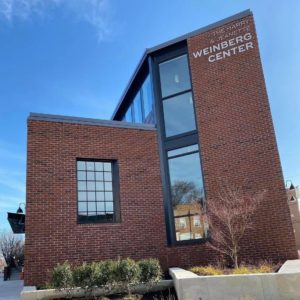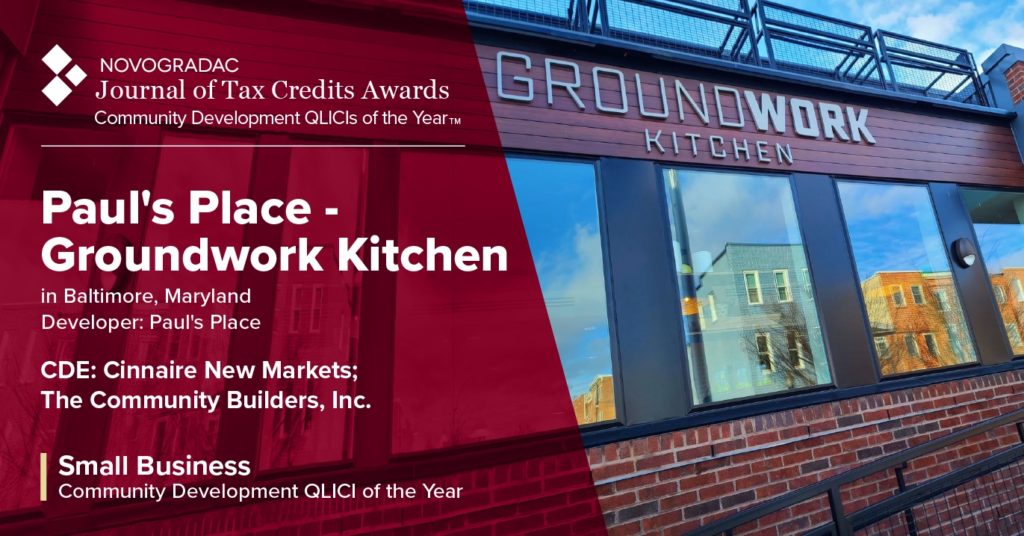Paul’s Place-Groundwork Kitchen Honored as Small Business QLICI of the Year
Ten community development entities (CDEs) that made qualified low-income community investments (QLICIs) into five businesses are the winners of the Novogradac Journal of Tax Credit QLICIs of the Year Awards. The awards honor CDEs who strive for excellence in community development. Cinnaire received the Small Business QLICI of the Year Award for its investment in Paul’s Place-Groundwork Kitchen in Baltimore, Maryland. DV Community Investment was one of two CDEs to make qualified low-income community investments into the property, along with The Community Builders, Inc.
Paul’s Place-Groundwork Kitchen is a 15,000-square-foot culinary arts center, restaurant, and carryout shop in Baltimore. Paul’s Place, a nonprofit established nearly 20 years ago, is launching Groundwork Kitchen for classes of up to 15 people to learn front-house and back-of-house skills for the hospitality industry, graduating 60 adults per year.
“Projects like Groundwork Kitchen create opportunities for low-income people while spurring economic development in underserved communities,” said Peter Giles, Cinnaire Vice President, Business Development. “The new markets tax credit is a powerful incentive allowing CDFIs to bring public and private resources to distressed neighborhoods, strengthening our ability to build healthy, equitable communities. We are honored to join CDEs from across the country to be recognized as a Novogradac award recipient for excellence in community development.”
Groundwork Kitchen is designed to stimulate the local economy, strengthen the community and transform lives. The $10 million project included the redevelopment of a former parking lot to make way for the 15,000-square-foot building. Cinnaire provided a $5.5 million NMTC investment to support Groundwork Kitchen.
“The new markets tax credit incentive is one of the most effective ways to invest in low-income communities and this year’s winners show the diversity in these types of investments,” said Michael J. Novogradac, CPA, managing partner of San Francisco based Novogradac. “A rural school, an urban culinary arts training center and a mixture of other investments are great examples of community development investment.”
The winners will be honored at the Novogradac 2021 New Markets Tax Credit Fall Conference October 28-29 in Austin, Texas.
 The two-and-a-half story Groundwork Kitchen culinary arts center was designed to fit in with the existing historical architecture in Pigtown and features vaulted wood ceilings and an abundance of natural light with many skylights and windows. Groundwork Kitchen offers a full service 150-seat restaurant and a carryout shop providing grab-and go-items. Classrooms, lockers, showers, and test kitchen are located in the basement. A mezzanine level overlooks the dining room and provides space for private parties, meeting space and celebrity chef evenings.
The two-and-a-half story Groundwork Kitchen culinary arts center was designed to fit in with the existing historical architecture in Pigtown and features vaulted wood ceilings and an abundance of natural light with many skylights and windows. Groundwork Kitchen offers a full service 150-seat restaurant and a carryout shop providing grab-and go-items. Classrooms, lockers, showers, and test kitchen are located in the basement. A mezzanine level overlooks the dining room and provides space for private parties, meeting space and celebrity chef evenings.
Groundwork Kitchen will teach and graduate 60 adults per year using a proven method of providing training, case management, and employment to stimulate the local economy, strengthen the community, and transform lives. The workforce development program will run in 13-week segments supporting 15 students per cohort with the goal to secure employment in the hospitality industry. Training includes sous chef marketable kitchen skills, front-of-house training, back-of-house training, and Serve Safe Certification at the managerial level. In addition, participants are matched with case managers to support their transition into the workforce. Other services including literacy training, computer skills classes, and employment services will be available to help ensure success. Nationally, the restaurant industry is expected to grow by 1.7 million jobs by 2025. The goal of Groundwork Kitchen is for 60 graduates to achieve and maintain employment each year.
In addition to Cinnaire, financing partners for Groundwork Kitchen include Chase, Enterprise Community Loan Fund, Neighborhood Investment Fund, the State of Maryland, and funds raised through a capital campaign. The Weinberg Foundation, the Abell Foundation, DHCDC- Baltimore Regional Neighborhood Initiative, the State of Maryland, and Neighborhood Improvement Impact Fund made significant contributions to the capital campaign.

